What classics give to modern theater: how “Macbeth” in Britain explores war and tyranny – Publications
[ad_1]
Before the creation of this text, the editors UP. Culture prompted by work on other material. Getting ready to celebrate a birthday Lesya Ukrainka, we sought to create an overview of Ukrainian theatrical productions based on the works of this bright Ukrainian playwright. However, the repertoires of Ukrainian theaters could not offer enough performances for such a text.
On the other hand, the demand for classics in modern Ukrainian theaters is incredibly high: the audience literally hunts for tickets to “The Witch of Konotop” by Hryhoriy Kvitka-Osnovianenko in the capital’s Franko Theater. The Zankovetska Theater in Lviv is selling out for the performance of Olga Kobylyanska’s “Land”, people from Frankiv are storming the local Drama Theater in the hope of seeing “The Kaidashev Family” by Ivan Nechui-Levytskyi or “Aeneid” by Ivan Kotlyarevskyi.
In the hope of inspiring Ukrainian directors to work more actively with Ukrainian classics, we draw attention to the experience of British theaters. There has been a real boom here in the last two years “Macbeth” by by William Shakespeare. The play recently celebrated its 400th anniversary, but it still resonates with the times. Nowadays, it is staged in many theaters and interpreted in a variety of ways. Historian and graduate of Oxford University Kateryna Disa talks about “Macbetomania” specially for UP Culture.
Shakespeare’s plays are often staged in British theatres – there is nothing strange or unexpected about it. If not in Britain, then where else? Ability to act in Shakespeare plays is a separate skill, Shakespeare’s plays are a separate genre in which some specialize. But most of them try themselves in this genre at least several times: Shakespeare’s plays are allocated in a separate category in actor’s resumes.
The beauty and appeal of Shakespeare is that, despite the somewhat archaic language, most of the themes raised by him remain relevant and can easily be modernized. It happens that the theme of a play touches a contemporary nerve and at the same time attracts the attention of several directors and theater companies.
Macbeth starring David Tennant at the Donmar.
Marc Brenner
It seems that lately the most relevant topics have started to be found in “Macbeth”. This tragedy, first staged in 1606, immediately raised several important problems for England and Scotland at the beginning of the 17th century.
First, it glorified the new Scottish dynasty on the English throne, because a few years before the premiere, the nephew of Elizabeth I, the Scottish King James, inherited the throne. And “Macbeth” indirectly referred to the history of the Scottish dynasty.
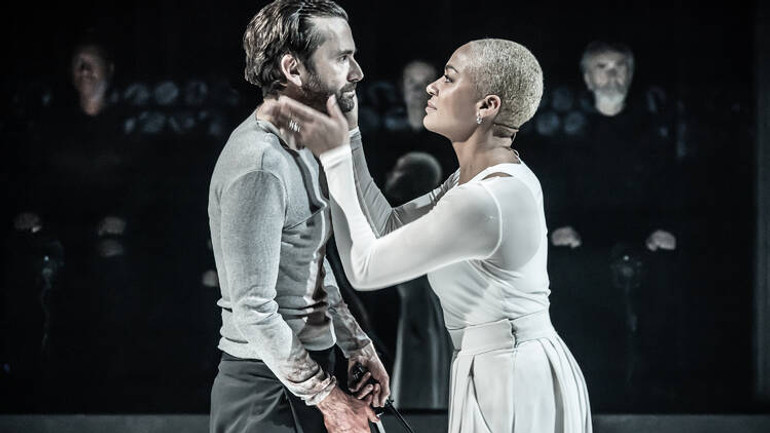
Macbeth starring David Tennant at the Donmar.
Marc Brenner
Second, the play explored the nature of political assassination of kings in light of the recently thwarted assassination attempt on the king during the Gunpowder Plot of 1605.
Thirdly, she addressed the topic of danger posed by witches. Adding to the poignancy of this topic was the fact that, in the opinion of the new king, it was the witches who tried to spoil his wedding, allegedly by sending a storm to the ship on which his bride was supposed to arrive from Denmark.
And for the past six months, starting from the summer of 2023 and ending in February 2024, “Macbeth” has been playing in three London theaters. In the summer of 2023 Abigail Graham puts a tragedy in the “Globe”. In December 2023 – February 2024 Max Webster directed “Macbeth” with by David Tennant in the main role in “Donmar” (Donmar Warehouse).
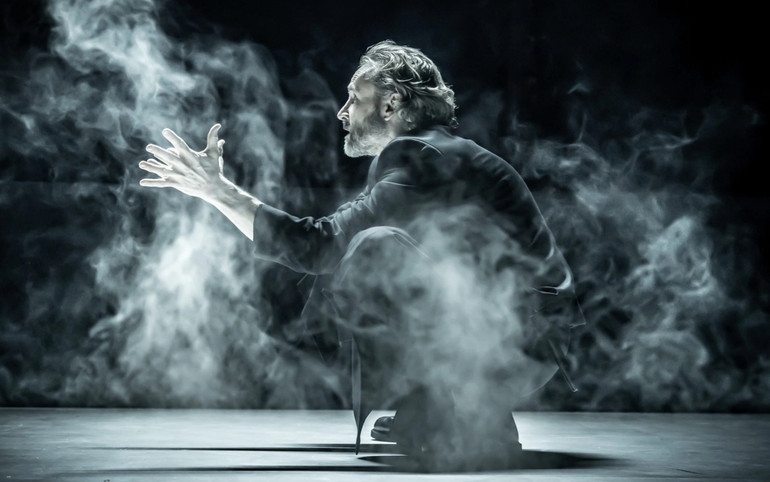
Macbeth starring David Tennant at the Donmar.
Marc Brenner
And in January-March 2024, “Doc X” will be staged Simon Godwin and Emily Burns with by Ralph Fiennes and Indira Varma starring. I managed to see the first and third performances. Considering Tennant’s insane popularity, tickets for all two months of performances of his “Macbeth” sold out on the first day. And here I will try to reflect on what is so attractive to modern creators and the public in “Macbeth”.
One of the central themes of the tragedy is war. There is nothing unusual in this either, because war appears in many Shakespearean tragedies – for example, in “Richard III”, “Henry V”, “Hamlet” and “King Lear”. But in “Macbeth” everything begins with war and ends with war. Macbeth’s rise occurs precisely because of his participation in the war.
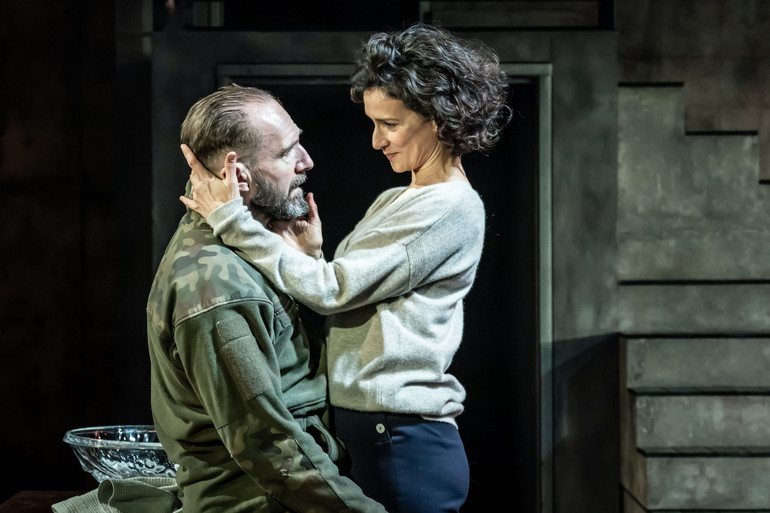
“Macbeth” in the Dock X industrial warehouse
Marc Brenner
Both productions pay attention to the war, modernize it: both there and there we have heroes in camouflage and bulletproof vests, but Godwin and Burns go further. In the scenography of their “Macbeth”, everything is imbued with modern warfare.
Taking the opportunity to play with the space offered by the large areas of the docks, the producers transformed the space behind the stage into a war-ravaged landscape. And precisely through this space the spectators pass to get to the hall: through the ruins of houses, dead trees and abandoned things. A burning car in the center: yes, they set it on fire before the first act begins.

Installation before the entrance to the spectator seats in Dock X
Before the start of the performance, soldiers in camouflage walk around the stage and around the hall. A siren announces the start of the performance, and then the sounds of helicopters and fighter jets are heard above. During the performance, explosions are heard from time to time. This sensory experience can be really triggering.
As a researcher of the history of the witch trials, I am always interested to see how the theme of witches is played in Macbeth. In the Globe production Abigail Graham made witches into men who appeared in chemical protection suits. And they prepare disgusting charms, using alleged laboratory equipment – this is how they return to the topic of COVID-19 (in Britain this topic is still moderately relevant), experiments on nature and attempts to manipulate it.
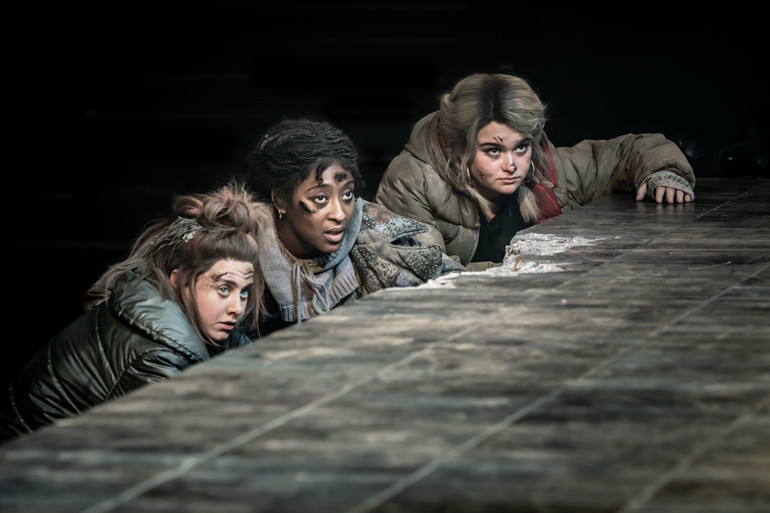
“Macbeth” in the Dock X industrial warehouse
Marc Brenner
Godwin and Burns took a different path and, with the help of witches, further explore the nature of war. Their witches – these are girls who survived the war, they are victims of the war and want justice. Due to such an interpretation, it was necessary to throw out the entire text related to evil charms, murders and damages. These witches do nothing evil, they are the personification of revenge and justice, always present somewhere in the background of events.
“Macbeth” was also and remains a careful study of the nature of tyranny: how a supposedly noble, honest man turns into a tyrant in a relatively short period of time, how he goes from a firm “no” to murder to cutting out entire families, including small children, and how his environment changes from brothers in arms to hired killers. Globe’s Macbeth Max Bennett, in my opinion, showed himself to be a not too convincing tyrant: he was made in some places inappropriately comic, a loser and an arrogant badass.
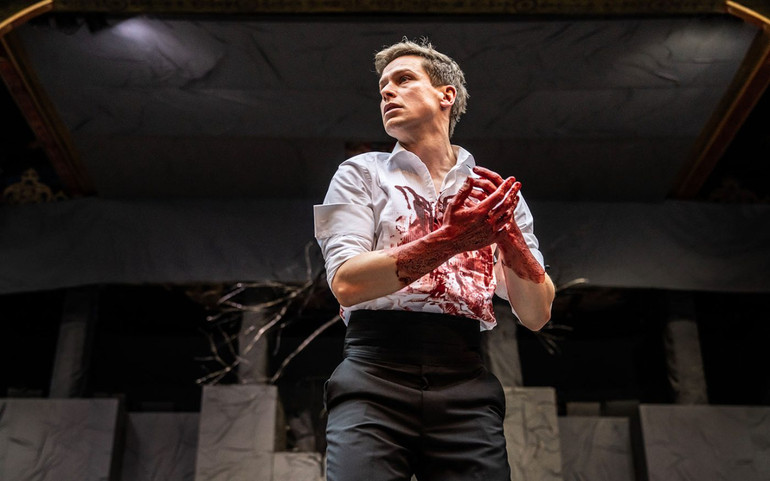
“Macbeth” at the Globe theater (The Globe)
Johan Persson
Godwin and Burns did not leave anything comic in their production (a characteristic feature of Shakespeare’s tragedies is the presence of comic characters and moments). Ralph Fiennes is much more interesting to watch: over the course of two hours, he gradually turns from a war hero into a bloody usurper and tyrant, who is instilled with the conviction of his own impunity, which he thoroughly enjoys.

“Macbeth” at the Globe theater (The Globe)
Johan Persson
Indira Varma is absolutely brilliant as Lady Macbeth, who you can see why her husband couldn’t resist her advances: a petulant and power-hungry wife who clearly loathes her husband but manipulates him to her advantage. Together they are like that symbiote, the parts of which complement each other, but at the same time are mutually destructive. According to the directors, this is a marriage that is falling apart before our eyes.
The victory over the tyrant at the end of the play gives the audience a ray of hope that crimes do not go unpunished. On the other hand, I wonder how many viewers draw parallels with the modern war, in particular in Ukraine, and if they do at all.
[ad_2]
Original Source Link











